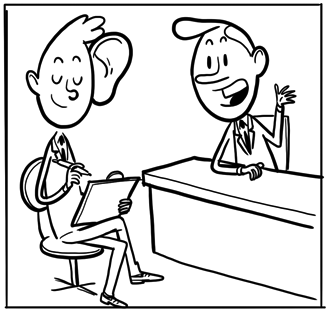 In the recent research we carried out in collaboration with the Harvard Business Manager we found that customers wanted vendors to communicate better. Some Sales People recognise this but have responded in exactly the wrong way. Customers don’t want slicker presentation materials. The real improvement Sales People need to make is not in how they talk, but how they listen.
In the recent research we carried out in collaboration with the Harvard Business Manager we found that customers wanted vendors to communicate better. Some Sales People recognise this but have responded in exactly the wrong way. Customers don’t want slicker presentation materials. The real improvement Sales People need to make is not in how they talk, but how they listen.
Attentive listening
Customers will rarely say you are a good listener but they will say things like “You helped us to clarify our thinking about our challenges” or “You really seem to understand what we are talking about”. This is the sort of response you will get if you are really good at attentive listening.
Lots of people have written about this sort of thing in the context of sales and beyond, so let me explain what I mean by attentive listening. This is most important in face-to-face situations but much of it applies on the phone and even to some degree in emails etc. where you have to make sure you have paid attention to what people have written.
Body language
Dogs have evolved to become man’s best friend by looking at people when they talk and reacting appropriately. Maintaining eye contact, nodding and smiling in the right places shows you are listening. Glancing at your phone or laptop shows you are not listening.
And of course you should study the body language of the person you are talking with. Are they fully engaged, leaning forward, nodding? Excellent, but look out for negative body language as well and change your behaviour if you see it.
Summarising
This is the technique of saying what your prospect has just said back to them. You can repeat it word for word and people tend to like hearing their own words and ideas spoken by someone else, but don’t overdo this or you will begin to sound as though you don’t understand what they are saying. Better, but more challenging, is to paraphrase what they have said as you go along. Take a chunk of what they have said and - being careful not to miss any key points – paraphrase it back to them in your own words. It provides concrete evidence that you are listening and really understand what they are saying.
As you get better at this you can start to introduce your own concepts and capabilities. For instance, when a prospect says they need to make sure they will get a good ROI you can agree with them and show an example of a sound Business Case. And if they talk about the need to deliver on schedule you can show an example of an Implementation Roadmap. So listening attentively also helps you to focus information on things that are relevant to the customer.
Did I get it right?
When you have done any of the above, ask if you have understood them correctly. And don’t be afraid to ask a question if you have not quite understood so they give you even more information to make sure you get the point.
The follow up question
This is where you show that you are not only listening, but also understanding. It does require a high level of concentration on what the prospect is saying and subject matter expertise, but if you can ask a good follow up question you can earn significant trust. Every situation is different but still, it is very useful to build up a question bank so when you come across a similar situation you can use a question that has worked before.
How much talking should I do?
Good question. I would say no more than half the talking in a sales meeting should be done by the Sales Person, even less in a first meeting. The more the customer talks, the more you can find out about them and their needs and the better you can present your solution as the best way to meet those needs.
How to become an attentive listener
The good thing about attentive listening is that the more you practice it the better you get. You are improving your skills in every meeting of course but it certainly helps if you can work with colleagues or a coach to see if you have any obvious faults that need correcting. Things like not appearing to listen, interrupting the customer in the middle of a sentence or paraphrasing incorrectly.
In my view, the most common reason why Sales People talk too much in meetings is lack of preparation. If you are fully prepared you will be calmer and more confident. Don’t be afraid of the occasional silence. If the prospect doesn’t answer a question straight away, if they need a moment to think, let them pause for thought. It’s an indication that you have made them think and maybe even reconsider their pre-conceived ideas – and that’s the point you earn trust and start taking take charge of the Sales Process.
Ask Yourself
-
Do your customers feel well understood after meeting you?
-
Do you ask for feedback at the end of every meeting?
-
Do you think you should talk less and listen more?
Enjoyed this blogpost? Download our eBook:

